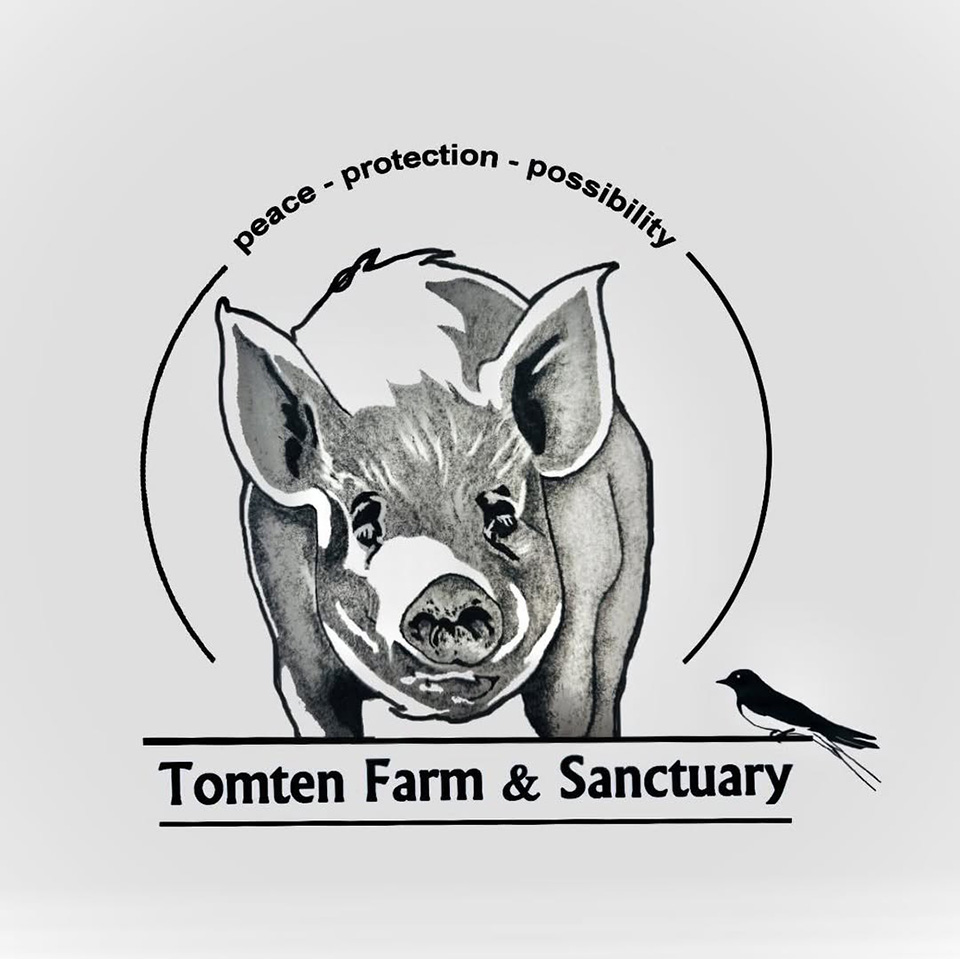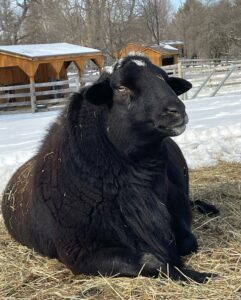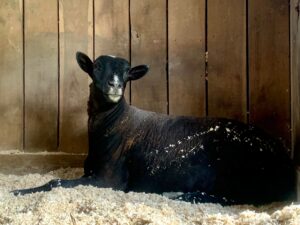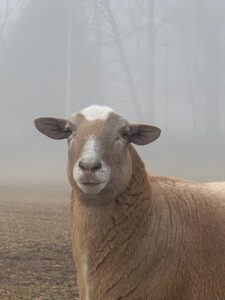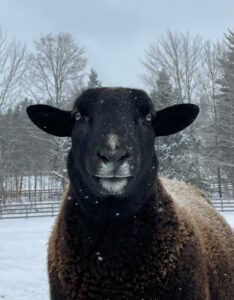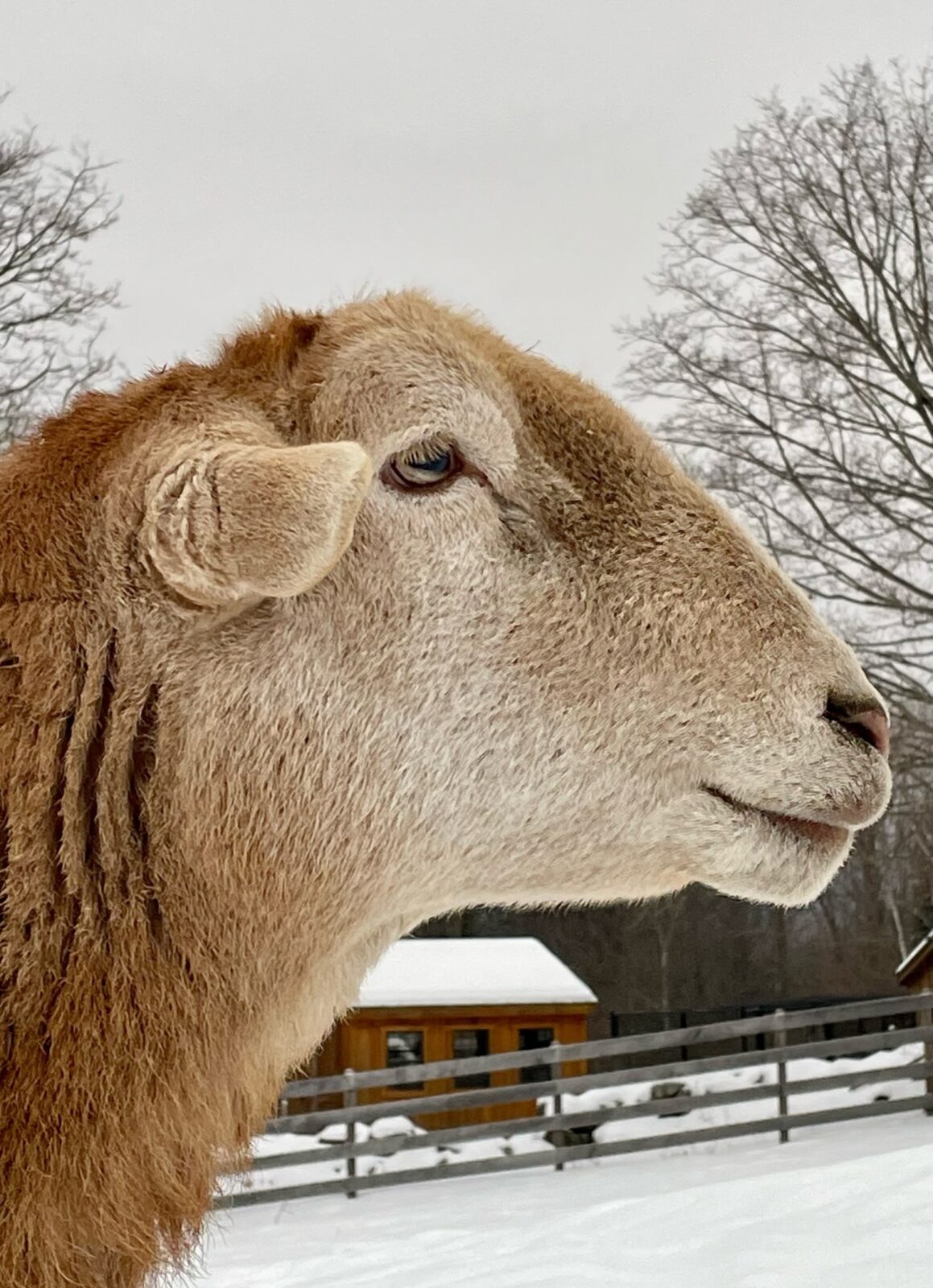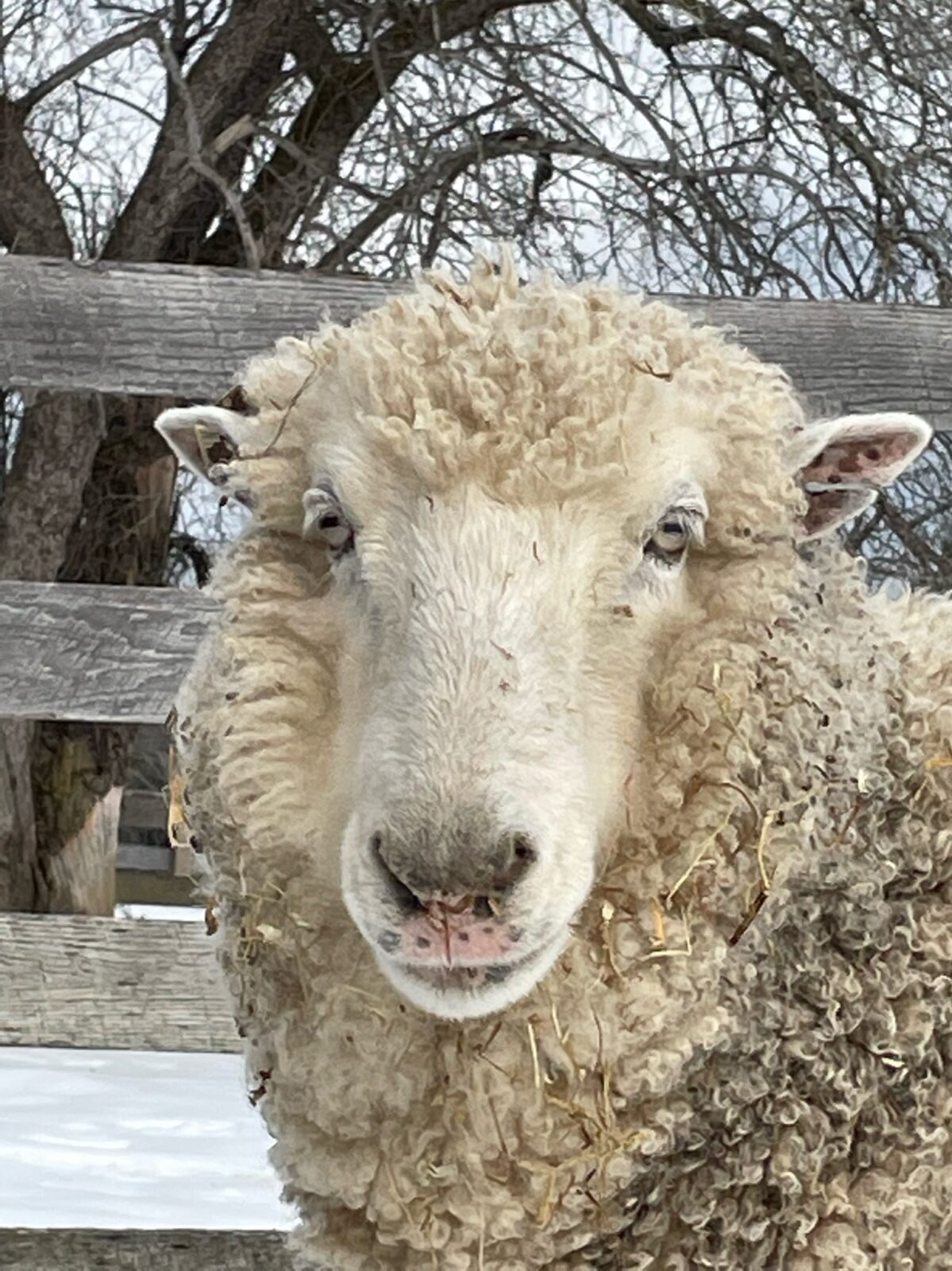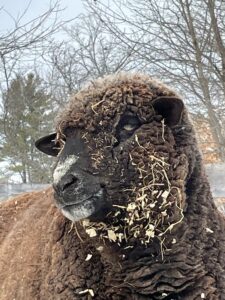Meet the Sheep
"Baa Baa black sheep, have you any wool?
No sir, no sir, NO bags full!"
Click on image to read individual stories.
Meet and Greet. Timothy Sullivan O’Hair.
In two shakes of a lamb’s tail dreams really can come true.
Seven years ago, on St. Patrick’s Day, Irish eyes were smiling on these two when we lifted our card at auction and began the bidding war that saved them. Bred specifically for sale, these two sheep, then lambs were destined for slaughter and someone's Easter dinner.
Today, the O'Hair siblings, "Fiona BAAagonia" and "Timothy Sullivan," are still happily celebrating the luck of the Irish right here at Tomten Farm and Sanctuary where they will remain for the rest of their days.
Few lambs are as lucky as these two were when we sat amidst the crowded stands of a small livestock auction and lifted our card. I do not remember the exact price we paid that day, but distinctly recall watching the weight of each animal pop up on the screen as they crossed the scale before entering the tiny ring. Bidding is by the price per pound, not the total cost of the life before you and every life there was sadly, one step away from the end of the line. Unlike the larger auction where our LaMancha goats, Nana and Lala came from, these two were saved at a much smaller, local sale yet it was still one of the more than 1200 USDA-approved livestock auctions/markets that exist throughout the country. Places where every animal is considered a production animal and never a beloved pet.
At that time of year, lambs are common and they usually cost more than you would expect as demand runs high for the upcoming holiday. I remember, even back then, many lives going for $2.75 per pound while healthier looking animals at a good weight grabbed a bit more. Some of the youngsters, including all the lambs, went for what was top dollar at the time, the $3. and $4. per pound range and almost all were headed for backyard slaughter. It makes me wonder what that same cost would be today and while I have not been to a livestock auction recently, the memory reminds me that so many look at each life, not as cherished beings but rather as a Sunday meal. Something that is now even painfully obvious every time I enter the grocery store. I hope you look at these two and see what we see: beautiful beings who should not be gracing a holiday table or an ingredient in a stew, but instead, living out a life of dreams come true.
While we cannot win every bid and there are always lives we leave behind, that day we were determined to walk away with those two lambs, fighting for them against several bidders and finally, beating the few gentlemen who certainly had different intentions than us. Did you know that there are many people who attend auction as they prefer to pick, purchase and then slaughter their own meat? In addition to these bidders, there are others who attend and also prefer to slaughter their own lambs but do so for ritual and religious beliefs. While the Humane Slaughter Act provides guidelines designed to reduce suffering at USDA slaughterhouses, there is no one to minimize the suffering of those sold for backyard slaughter and at every sale, we wish we could do more than we can.
After settling our bill, we scooped our tired, little lambs in our arms and drove away. Little did they know it was toward their happily ever after. We welcomed them in 2015, our first two sheep, to the loving embrace of Tomten where they affectionately became part of the goat herd, "The Doodles."
Both Timothy and Fiona are Katahdin Hair sheep, a breed that originated right here in New England and are named after Mt. Katahdin in Maine. The hair coat of this breed varies in length and texture but usually has both coarse outer hair fibers and an undercoat of fine wooly fibers. There is no shearing necessary which makes them a favorite for meat breeders who appreciate their low maintenance and high yield. I will admit, we love the shedding versus shearing too and feel good knowing that this hardy breed has little concern for the New England cold.
As with all our rescues, they would not be here without your life saving support and, in this case, without the efforts of Laima and Adrian who opened their home, built a quarantine pen, bottle fed and took daily care of our new additions until they were ready to come to the farm. We could not have saved them without such support and we cannot provide our Rescues lifetime care, peace, protection and possibility without you.
Thank you for your presence and kindness on behalf of Timothy and Fiona whose everyday is baaaeutiful thanks to you!
Timothy Sullivan O’Hair
Meet and Greet. Fiona BAAgonia O’Hair.
In two shakes of a lamb’s tail dreams really can come true.
Seven years ago, on St. Patrick’s Day, Irish eyes were smiling on these two when we lifted our card at auction and began the bidding war that saved them. Bred specifically for sale, these two sheep, then lambs were destined for slaughter and someone's Easter dinner.
Today, the O'Hair siblings, "Fiona BAAagonia" and "Timothy Sullivan," are still happily celebrating the luck of the Irish right here at Tomten Farm and Sanctuary where they will remain for the rest of their days.
Few lambs are as lucky as these two were when we sat amidst the crowded stands of a small livestock auction and lifted our card. I do not remember the exact price we paid that day, but distinctly recall watching the weight of each animal pop up on the screen as they crossed the scale before entering the tiny ring. Bidding is by the price per pound, not the total cost of the life before you and every life there was sadly, one step away from the end of the line. Unlike the larger auction where our LaMancha goats, Nana and Lala came from, these two were saved at a much smaller, local sale yet it was still one of the more than 1200 USDA-approved livestock auctions/markets that exist throughout the country. Places where every animal is considered a production animal and never a beloved pet.
At that time of year, lambs are common and they usually cost more than you would expect as demand runs high for the upcoming holiday. I remember, even back then, many lives going for $2.75 per pound while healthier looking animals at a good weight grabbed a bit more. Some of the youngsters, including all the lambs, went for what was top dollar at the time, the $3. and $4. per pound range and almost all were headed for backyard slaughter. It makes me wonder what that same cost would be today and while I have not been to a livestock auction recently, the memory reminds me that so many look at each life, not as cherished beings but rather as a Sunday meal. Something that is now even painfully obvious every time I enter the grocery store. I hope you look at these two and see what we see: beautiful beings who should not be gracing a holiday table or an ingredient in a stew, but instead, living out a life of dreams come true.
While we cannot win every bid and there are always lives we leave behind, that day we were determined to walk away with those two lambs, fighting for them against several bidders and finally, beating the few gentlemen who certainly had different intentions than us. Did you know that there are many people who attend auction as they prefer to pick, purchase and then slaughter their own meat? In addition to these bidders, there are others who attend and also prefer to slaughter their own lambs but do so for ritual and religious beliefs. While the Humane Slaughter Act provides guidelines designed to reduce suffering at USDA slaughterhouses, there is no one to minimize the suffering of those sold for backyard slaughter and at every sale, we wish we could do more than we can.
After settling our bill, we scooped our tired, little lambs in our arms and drove away. Little did they know it was toward their happily ever after. We welcomed them in 2015, our first two sheep, to the loving embrace of Tomten where they affectionately became part of the goat herd, "The Doodles."
Both Timothy and Fiona are Katahdin Hair sheep, a breed that originated right here in New England and are named after Mt. Katahdin in Maine. The hair coat of this breed varies in length and texture but usually has both coarse outer hair fibers and an undercoat of fine wooly fibers. There is no shearing necessary which makes them a favorite for meat breeders who appreciate their low maintenance and high yield. I will admit, we love the shedding versus shearing too and feel good knowing that this hardy breed has little concern for the New England cold.
As with all our rescues, they would not be here without your life saving support and, in this case, without the efforts of Laima and Adrian who opened their home, built a quarantine pen, bottle fed and took daily care of our new additions until they were ready to come to the farm. We could not have saved them without such support and we cannot provide our Rescues lifetime care, peace, protection and possibility without you.
Thank you for your presence and kindness on behalf of Timothy and Fiona whose everyday is baaaeutiful thanks to you!
Fiona BAAgonia O’Hair
Meet and Greet. Gladys NoWool.
In early March, as Spring hovers just days away and the sun whispers to the earth so it may be reborn, life is welcomed everywhere. Barns begin to fill with the sound of bleating and beautiful lambs are welcomed, sadly, however, most are animals bred for the sole purpose of slaughter often just before the April holidays. In 2016, during St. Patrick’s Day week, we rescued Gladys NoWool and her two babies, Gustavo and Guiseppi. When we went to the sale, we had hopes of rescuing two hot house lambs, those bred early and kept inside with the sole intention of meeting holiday demand. The year before we had been fortunate and despite a shortage of lambs and a bidding war with those who had other intentions, we had welcomed Timothy Sullivan O’Hair and his sister, Fiona Baagonia O’Hair to Tomten Farm and Sanctuary. We were hoping our luck would continue and this year we would welcome a few more sheep to our herd. Of course, when we attend livestock auctions, we never know for certain what we will come home with but we always go in with a plan. We had quarantine and foster ready and waiting and while the soon to be arriving holiday brought our immediate attention to lambs, as always, our minds were open to whatever sheep needed us most that day. Perhaps it would be a ewe (female) who couldn't keep up with breeding demands or a wether (castrated male) whose wool wasn't up to snuff, both would have fine too. However, all we knew was that fairness to Rastus, our very old Nubian goat wether, no matter how needy or how beautiful, we, unfortunately, could not welcome a ram. We always arrive early at sale to be sure we have the chance to look, look and look again as the animals arrive trailer by trailer and are ushered into pens. Choosing not only determines who we could possibly save but it is a determination of who we cannot. The decision is not to be rushed or taken lightly when all are worthy and in need. We pick, therefore, based on what is in the best interest of those already on the farm. On that day, just before the auction started, we did one last walk through. We passed the goats and sheep, the cows and the pigs and as we checked a back pen, a trailer drove in. We paused to see a few goats unload and a few sheep too and then we saw the lambs and the ewe, together. Our minds immediately began to race as we crunched numbers, counted our cash and wondered how we could step up and embrace all three. As chance would have it, the manager (or perhaps the owner) of the sale saw me watching and while he did not know we were Tomten, he was familiar with our presence and very aware that we were not there for meat. After a brief discussion, he offered to run the three through alone, an act that ensured we had a better chance of welcoming them to peace, protection and possibility. As animals move from pen to pen at sale, they are almost always separated before walking on the scale and heading in the auction ring. Kids go with kids, lambs go with lambs and those who bid, bid choice - the highest bidder gets whomever he/she would like at the price. Those who remain are sold for less and less until the groups are dispersed. One almost never sees a Mom and her babies together after they arrive and we waited sadly watching those in the sell order who came before them, the fowl, the rabbits, the goats being separated from one another and heading toward the sad fates that lay before them. But on that day, in that case, this little family actually came together, left together and will remain together at Tomten Farm and Sanctuary for the rest of their days. Rescue is a series of miracles made possible by the kindness of many who look beyond the species, the label and the stereotypes. We are fortunate an exception was made that day and the bids did not exceed what we had available, but none are luckier than the NoWools, the Katahdin sheep with coats of hair and not wool.
Introducing, three of our much loved Sheepadoodles, Gladys, Gustavo and Guiseppi NoWool.
Gladys NoWool
Meet and Greet. Gustavo NoWool.
In early March, as Spring hovers just days away and the sun whispers to the earth so it may be reborn, life is welcomed everywhere. Barns begin to fill with the sound of bleating and beautiful lambs are welcomed, sadly, however, most are animals bred for the sole purpose of slaughter often just before the April holidays. In 2016, during St. Patrick’s Day week, we rescued Gladys NoWool and her two babies, Gustavo and Guiseppi. When we went to the sale, we had hopes of rescuing two hot house lambs, those bred early and kept inside with the sole intention of meeting holiday demand. The year before we had been fortunate and despite a shortage of lambs and a bidding war with those who had other intentions, we had welcomed Timothy Sullivan O’Hair and his sister, Fiona Baagonia O’Hair to Tomten Farm and Sanctuary. We were hoping our luck would continue and this year we would welcome a few more sheep to our herd. Of course, when we attend livestock auctions, we never know for certain what we will come home with but we always go in with a plan. We had quarantine and foster ready and waiting and while the soon to be arriving holiday brought our immediate attention to lambs, as always, our minds were open to whatever sheep needed us most that day. Perhaps it would be a ewe (female) who couldn't keep up with breeding demands or a wether (castrated male) whose wool wasn't up to snuff, both would have fine too. However, all we knew was that fairness to Rastus, our very old Nubian goat wether, no matter how needy or how beautiful, we, unfortunately, could not welcome a ram. We always arrive early at sale to be sure we have the chance to look, look and look again as the animals arrive trailer by trailer and are ushered into pens. Choosing not only determines who we could possibly save but it is a determination of who we cannot. The decision is not to be rushed or taken lightly when all are worthy and in need. We pick, therefore, based on what is in the best interest of those already on the farm. On that day, just before the auction started, we did one last walk through. We passed the goats and sheep, the cows and the pigs and as we checked a back pen, a trailer drove in. We paused to see a few goats unload and a few sheep too and then we saw the lambs and the ewe, together. Our minds immediately began to race as we crunched numbers, counted our cash and wondered how we could step up and embrace all three. As chance would have it, the manager (or perhaps the owner) of the sale saw me watching and while he did not know we were Tomten, he was familiar with our presence and very aware that we were not there for meat. After a brief discussion, he offered to run the three through alone, an act that ensured we had a better chance of welcoming them to peace, protection and possibility. As animals move from pen to pen at sale, they are almost always separated before walking on the scale and heading in the auction ring. Kids go with kids, lambs go with lambs and those who bid, bid choice - the highest bidder gets whomever he/she would like at the price. Those who remain are sold for less and less until the groups are dispersed. One almost never sees a Mom and her babies together after they arrive and we waited sadly watching those in the sell order who came before them, the fowl, the rabbits, the goats being separated from one another and heading toward the sad fates that lay before them. But on that day, in that case, this little family actually came together, left together and will remain together at Tomten Farm and Sanctuary for the rest of their days. Rescue is a series of miracles made possible by the kindness of many who look beyond the species, the label and the stereotypes. We are fortunate an exception was made that day and the bids did not exceed what we had available, but none are luckier than the NoWools, the Katahdin sheep with coats of hair and not wool.
Introducing, three of our much loved Sheepadoodles, Gladys, Gustavo and Guiseppi NoWool.
Gustavo NoWool
Meet and Greet. Giuseppi NoWool.
In early March, as Spring hovers just days away and the sun whispers to the earth so it may be reborn, life is welcomed everywhere. Barns begin to fill with the sound of bleating and beautiful lambs are welcomed, sadly, however, most are animals bred for the sole purpose of slaughter often just before the April holidays. In 2016, during St. Patrick’s Day week, we rescued Gladys NoWool and her two babies, Gustavo and Guiseppi. When we went to the sale, we had hopes of rescuing two hot house lambs, those bred early and kept inside with the sole intention of meeting holiday demand. The year before we had been fortunate and despite a shortage of lambs and a bidding war with those who had other intentions, we had welcomed Timothy Sullivan O’Hair and his sister, Fiona Baagonia O’Hair to Tomten Farm and Sanctuary. We were hoping our luck would continue and this year we would welcome a few more sheep to our herd. Of course, when we attend livestock auctions, we never know for certain what we will come home with but we always go in with a plan. We had quarantine and foster ready and waiting and while the soon to be arriving holiday brought our immediate attention to lambs, as always, our minds were open to whatever sheep needed us most that day. Perhaps it would be a ewe (female) who couldn't keep up with breeding demands or a wether (castrated male) whose wool wasn't up to snuff, both would have fine too. However, all we knew was that fairness to Rastus, our very old Nubian goat wether, no matter how needy or how beautiful, we, unfortunately, could not welcome a ram. We always arrive early at sale to be sure we have the chance to look, look and look again as the animals arrive trailer by trailer and are ushered into pens. Choosing not only determines who we could possibly save but it is a determination of who we cannot. The decision is not to be rushed or taken lightly when all are worthy and in need. We pick, therefore, based on what is in the best interest of those already on the farm. On that day, just before the auction started, we did one last walk through. We passed the goats and sheep, the cows and the pigs and as we checked a back pen, a trailer drove in. We paused to see a few goats unload and a few sheep too and then we saw the lambs and the ewe, together. Our minds immediately began to race as we crunched numbers, counted our cash and wondered how we could step up and embrace all three. As chance would have it, the manager (or perhaps the owner) of the sale saw me watching and while he did not know we were Tomten, he was familiar with our presence and very aware that we were not there for meat. After a brief discussion, he offered to run the three through alone, an act that ensured we had a better chance of welcoming them to peace, protection and possibility. As animals move from pen to pen at sale, they are almost always separated before walking on the scale and heading in the auction ring. Kids go with kids, lambs go with lambs and those who bid, bid choice - the highest bidder gets whomever he/she would like at the price. Those who remain are sold for less and less until the groups are dispersed. One almost never sees a Mom and her babies together after they arrive and we waited sadly watching those in the sell order who came before them, the fowl, the rabbits, the goats being separated from one another and heading toward the sad fates that lay before them. But on that day, in that case, this little family actually came together, left together and will remain together at Tomten Farm and Sanctuary for the rest of their days. Rescue is a series of miracles made possible by the kindness of many who look beyond the species, the label and the stereotypes. We are fortunate an exception was made that day and the bids did not exceed what we had available, but none are luckier than the NoWools, the Katahdin sheep with coats of hair and not wool.
Introducing, three of our much loved Sheepadoodles, Gladys, Gustavo and Guiseppi NoWool.
Giuseppi NoWool
Meet and Greet. Lucy L’Ewe Leicester.
The Tomten Knitting Club
Our four senior ewes arrived at Tomten Farm and Sanctuary late last year. I’ll be honest, I have a hard time comprehending how someone can cull a life at the end of their days, a life who truly gave them everything for many years. At the same time, I have a hard time understanding how it is that I used to eat meat and so I find choosing to accept what is as being far, far kinder than judgement. We are all on our own journey and I am glad these ewes will end theirs here at Tomten. Their working past is behind them and together we gift a peaceful tomorrow no matter how few tomorrows there may be.
They came from a small sheep farm. The kind of farm one slows down to view as they drive along a New England road. The kind of farm that creates products I once found beautiful, before I truly comprehended the real cost of each piece was not the hours it took to make, the craftsmanship that took years to learn or the numbers on a price tag, but rather the life of an innocent animal. There is nothing more valuable than life and as I know more, I am increasingly aware of all the products that take it.
Our girls were raised there. They lambed there, year after year, life after life and, with few exceptions, had their babies torn away. This is the reality of farming, even at small, family-owned farms. Yes, they had each other, the grass underfoot, the sun on their backs, a roof overhead and food in their bellies, but their home was dependent on their productivity. And, when the years no longer allowed for that, they were scheduled to go, to ship to auction and end their days at slaughter. Seniors shipped away. The truth is, it is far more cost effective and far less labor intensive for many farmers to cull the lives who no longer produce than to euthanize them and bury them on the farm. There are always hard choices and often there is much more to consider than most realize.
Luckily, a neighbor had fallen in love with Lucy and had saved her life once before through teaching her the handling skills that had allowed her to remain in the flock. She offered her walks in the woods and a friendship that would impact her and her friends when they needed it most. It was this neighbor who reached out to us, was the go between and kindly took care of the blood work and health inspections that allowed them to catch a ride to Tomten. It was her love of this ewe that saved all four lives and when we went to pick them up not only was she grateful, she had tears in her eyes. We are all human and if we are lucky, we are all touched by an animal(s). What a gift to be able to make a difference for her, the ewe she loved, another three and perhaps the farmer and even all of you.
We loaded them together, the farmer, the neighbor, a helper and me. It was with the efficiency of those who run out of time every day and while we come from different views of a farm, I watched this hardworking woman farmer and was reminded why we say it does not need to be us against them. While her neighbor had done the rescuing, she had chosen to send her ewes to us versus the auction house. To subscribe to "us against them" is to believe we should condemn anyone who has eaten or used an animal product and at some point, vegan, vegetarian, pescatarian or other, we would all be guilty of that charge.
Yet, while I embrace compassion and respect for we humans, my heart goes out to the animals who give so much, far more than most consumers are even aware of. My heart aches at the thought of four loyal ewes who would have ended their days in fear, first on a cull truck and then via auction at slaughter where they would most likely be rendered. And so I rescue. Together, we rescue, making a difference to lives in need.
Together, welcomed four seniors to Tomten. Today Lucy and Woolamina remain, the bond of friendship keeping them together for the rest of their days. Sadly, just this Spring we said goodbye to Mother and daughter, Tula and Nellie Purl. They were sadly saved much too late and their bodies broken and painful beyond repair. They had literally been used until the end of their life and I hope their presence will remain with us for many years, educating others long after they are gone.
With a life expectancy of 10-12 years, we do not know exactly how long Lucy will be here but we are grateful she inspired kindness from a neighbor, that love saved her and her friends lives. A love that expects nothing in return but simply admires, respects and befriends because all life is deserving of dreams come true. As the days pass, we hope she comes to call Tomten home and trust that we will do all we can to make her and Woolamina’s life easy and comfortable for the rest of their days.
Lucy L’Ewe Leicester
Meet and Greet. Woolamina Corriedale.
The Tomten Knitting Club
Our four senior ewes arrived at Tomten Farm and Sanctuary late last year. I’ll be honest, I have a hard time comprehending how someone can cull a life at the end of their days, a life who truly gave them everything for many years. At the same time, I have a hard time understanding how it is that I used to eat meat and so I find choosing to accept what is as being far, far kinder than judgement. We are all on our own journey and I am glad these ewes will end theirs here at Tomten. Their working past is behind them and together we gift a peaceful tomorrow no matter how few tomorrows there may be.
They came from a small sheep farm. The kind of farm one slows down to view as they drive along a New England road. The kind of farm that creates products I once found beautiful, before I truly comprehended the real cost of each piece was not the hours it took to make, the craftsmanship that took years to learn or the numbers on a price tag, but rather the life of an innocent animal. There is nothing more valuable than life and as I know more, I am increasingly aware of all the products that take it.
Our girls were raised there. They lambed there, year after year, life after life and, with few exceptions, had their babies torn away. This is the reality of farming, even at small, family-owned farms. Yes, they had each other, the grass underfoot, the sun on their backs, a roof overhead and food in their bellies, but their home was dependent on their productivity. And, when the years no longer allowed for that, they were scheduled to go, to ship to auction and end their days at slaughter. Seniors shipped away. The truth is, it is far more cost effective and far less labor intensive for many farmers to cull the lives who no longer produce than to euthanize them and bury them on the farm. There are always hard choices and often there is much more to consider than most realize.
Luckily, a neighbor had fallen in love with Lucy and had saved her life once before through teaching her the handling skills that had allowed her to remain in the flock. She offered her walks in the woods and a friendship that would impact her and her friends when they needed it most. It was this neighbor who reached out to us, was the go between and kindly took care of the blood work and health inspections that allowed them to catch a ride to Tomten. It was her love of this ewe that saved all four lives and when we went to pick them up not only was she grateful, she had tears in her eyes. We are all human and if we are lucky, we are all touched by an animal(s). What a gift to be able to make a difference for her, the ewe she loved, another three and perhaps the farmer and even all of you.
We loaded them together, the farmer, the neighbor, a helper and me. It was with the efficiency of those who run out of time every day and while we come from different views of a farm, I watched this hardworking woman farmer and was reminded why we say it does not need to be us against them. While her neighbor had done the rescuing, she had chosen to send her ewes to us versus the auction house. To subscribe to "us against them" is to believe we should condemn anyone who has eaten or used an animal product and at some point, vegan, vegetarian, pescatarian or other, we would all be guilty of that charge.
Yet, while I embrace compassion and respect for we humans, my heart goes out to the animals who give so much, far more than most consumers are even aware of. My heart aches at the thought of four loyal ewes who would have ended their days in fear, first on a cull truck and then via auction at slaughter where they would most likely be rendered. And so I rescue. Together, we rescue, making a difference to lives in need.
Together, welcomed four seniors to Tomten. Today Lucy and Woolamina remain, the bond of friendship keeping them together for the rest of their days. Sadly, just this Spring we said goodbye to Mother and daughter, Tula and Nellie Purl. They were sadly saved much too late and their bodies broken and painful beyond repair. They had literally been used until the end of their life and I hope their presence will remain with us for many years, educating others long after they are gone.
With a life expectancy of 10-12 years, we do not know exactly how long Lucy will be here but we are grateful she inspired kindness from a neighbor, that love saved her and her friends lives. A love that expects nothing in return but simply admires, respects and befriends because all life is deserving of dreams come true. As the days pass, we hope she comes to call Tomten home and trust that we will do all we can to make her and Woolamina’s life easy and comfortable for the rest of their days.
Woolamina Corriedale
Facts about Sheep
Coming soon...
